The 7 best artificial intelligence products for your business in 2026

Kenneth Pangan
Last edited January 12, 2026

Let's be honest, "artificial intelligence" is a term that gets thrown around a lot. It’s no longer some sci-fi dream; it's a real tool that businesses are using to get work done faster and smarter. But with hundreds of AI products popping up, it’s hard to tell what’s genuinely useful and what’s just hype. How do you find a tool that solves an actual problem without needing a team of data scientists to get it running?
That's where this guide comes in. We’ve cut through the noise for you, putting together a list of practical artificial intelligence products for 2026. We'll look at tools that can handle customer service, organize your internal knowledge, and generally make your workday a little less hectic.
What are artificial intelligence products?
So, what are we really talking about here? At the end of the day, artificial intelligence products are just software that uses AI to do tasks that would normally need a person. This could be anything from answering customer questions and analyzing data to drafting an email or writing a bit of code.
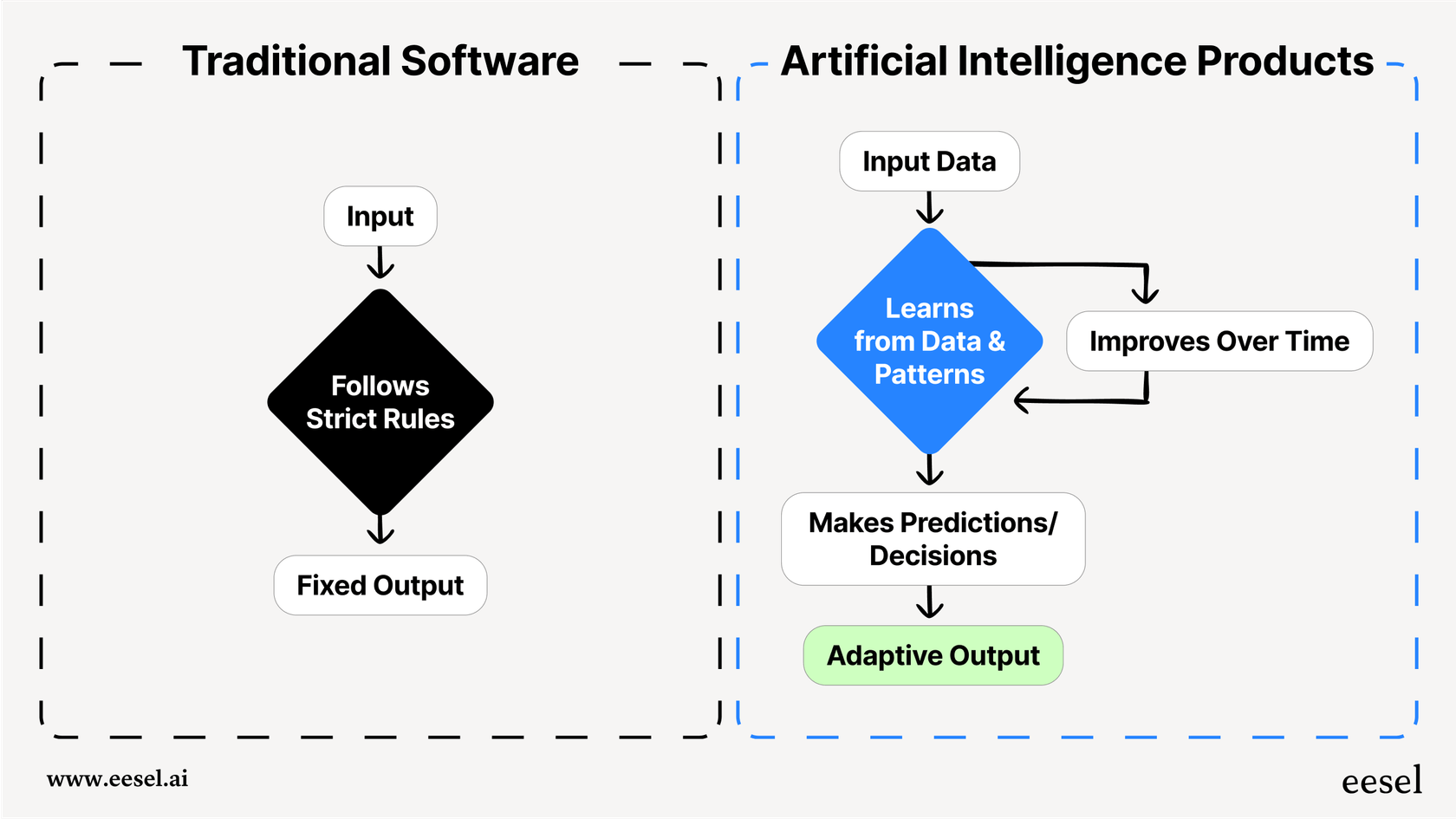
Unlike your standard software that just follows a strict set of rules, AI products can learn from information, spot patterns, and make their own decisions. For a business, that means they can handle complex tasks, give customers more personalized support, and find useful nuggets of information in mountains of data. The best part? You don't need a computer science degree to use them anymore.
How we chose the best artificial intelligence products for this list
To build this list, we focused on what actually works for business teams, especially those in support, IT, and operations. We weren't looking for flashy demos, but for real-world results.
- Quick to get started: Can you sign up and see it working in minutes, not months? We picked products that are genuinely self-serve, letting you skip the long sales calls and complicated setups.
- Solves a real problem: Does the tool make a noticeable difference? We looked for products that deliver a clear return, whether that’s by cutting down on support tickets, helping agents respond faster, or making company info easy to find.
- You're in control: Can you tweak the tool to fit how your team works? The best AI tools let you manage their behavior, so you can decide exactly what they do, what information they use, and how they sound.
- Plays well with others: Does it connect with the software you already use? We chose products that plug into common help desks, chat platforms, and knowledge bases without forcing you to change your entire setup.
- No-nonsense pricing: Is the cost clear and predictable? We focused on tools with straightforward pricing models, so you won’t get hit with surprise fees for every little interaction.
Comparison of the top artificial intelligence products in 2026
Here’s a quick side-by-side look at our top picks.
| Product | Best for | Key feature | Starting price |
|---|---|---|---|
| eesel AI | Customer service & internal support automation | Self-serve setup and ticket simulation | $299/month |
| ChatGPT | General-purpose content & idea generation | Advanced reasoning and conversational ability | Free plan available |
| Notion AI | Integrated knowledge and project management | Q&A over internal documents and wikis | $10/user/month add-on |
| Zendesk AI | Teams looking for a mature, enterprise-grade suite | Native integration within Zendesk tickets | Varies (add-on) |
| Synthesia | Creating professional training videos | AI avatars and text-to-video generation | $29/month |
| Zapier | Connecting apps and automating simple workflows | Trigger-based automation across 7,000+ apps | Free plan available |
| Midjourney | High-quality, artistic image generation | Unique aesthetic and powerful image prompts | $10/month |
The 7 best artificial intelligence products to try in 2026
Alright, let's get into the details of the tools that made the cut. We've got a mix of specialized and all-purpose products that can help out in different corners of your business.
1. eesel AI
eesel AI is an AI platform built for the specific needs of customer service, ITSM, and internal knowledge management. It connects directly with your existing help desk (like Zendesk or Freshdesk), chat tools (like Slack), and knowledge sources (Confluence, Google Docs, past tickets) to automate support, give agents a hand, and answer internal questions.
What really sets eesel AI apart is that you can just sign up and use it. No sales calls, no lengthy onboarding. You can connect your help desk with a click and have it running in minutes. It has a powerful simulation mode that lets you test the AI on thousands of your past tickets. This way, you can see exactly how it will perform and figure out your potential ROI before you turn it on for customers. It’s a "test with confidence" approach that you don't see with competitors who usually just offer a canned demo.
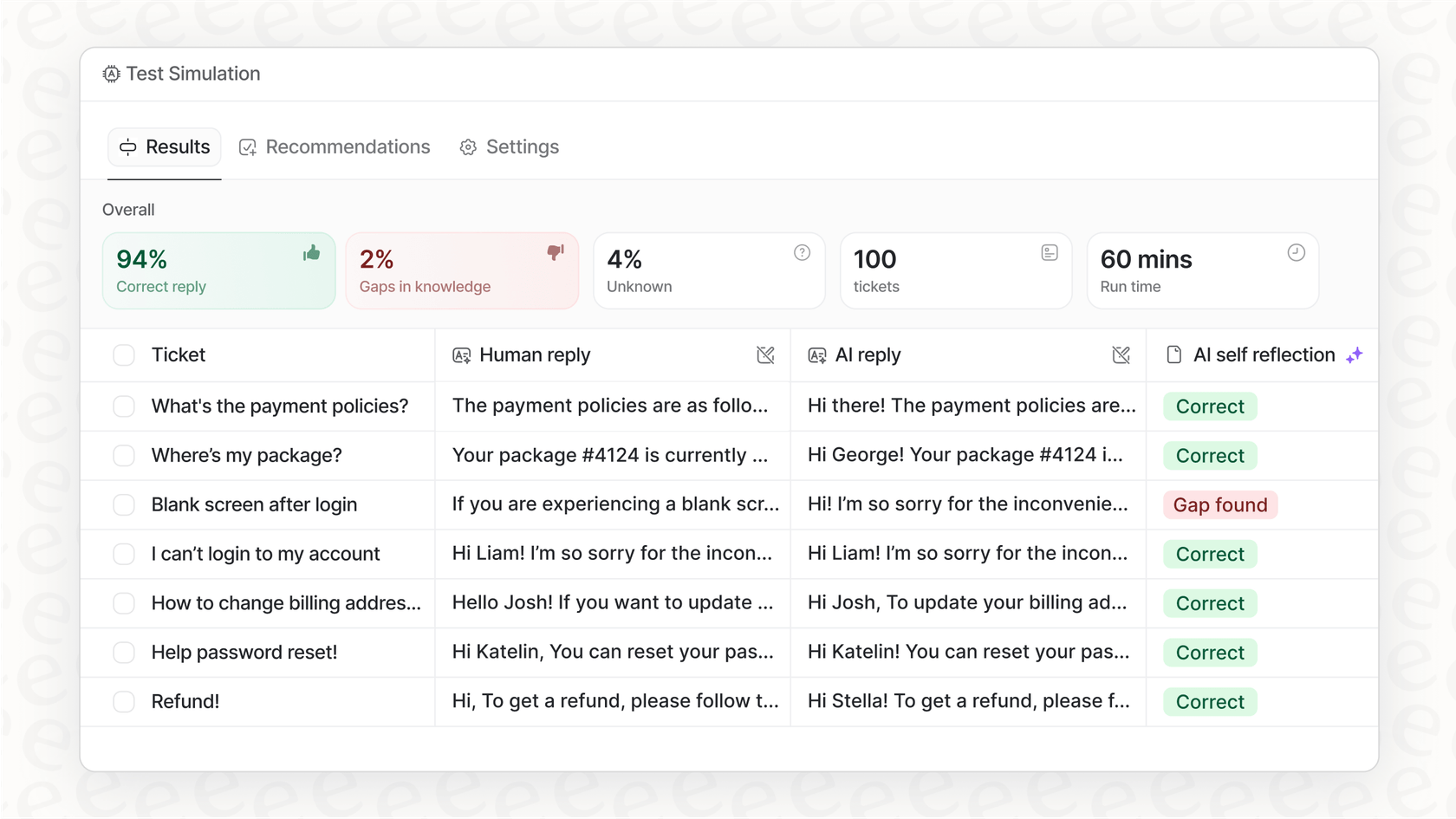
You also get full control over the automation. You can decide which tickets the AI handles, customize its personality, and even set up custom actions, like looking up order info from Shopify or routing tickets based on certain keywords.
Pros:
- Go live in minutes on a truly self-serve platform.
- Simulate performance on your own historical tickets before launch.
- Brings together knowledge from help desks, wikis, and docs.
- Transparent pricing with no hidden per-resolution fees.
Cons:
- It's focused on support and internal knowledge, so it's not a do-everything AI.
Pricing: Starts at $299/month for the Team plan.
2. ChatGPT
You’ve probably heard of ChatGPT; it’s the chatbot that really put generative AI on the map. It's a fantastic tool for brainstorming, drafting emails, writing code, summarizing long documents, and getting answers to complex questions. Because it's just a simple chat window, anyone can jump in and start using it.
For businesses, ChatGPT is like a helpful assistant for marketing, sales, and content teams. It can spit out blog post ideas, write social media captions, or draft a first-pass sales email. The newest models, like GPT-4o, can even look at data in files you upload and create charts, which is handy for quick analysis.
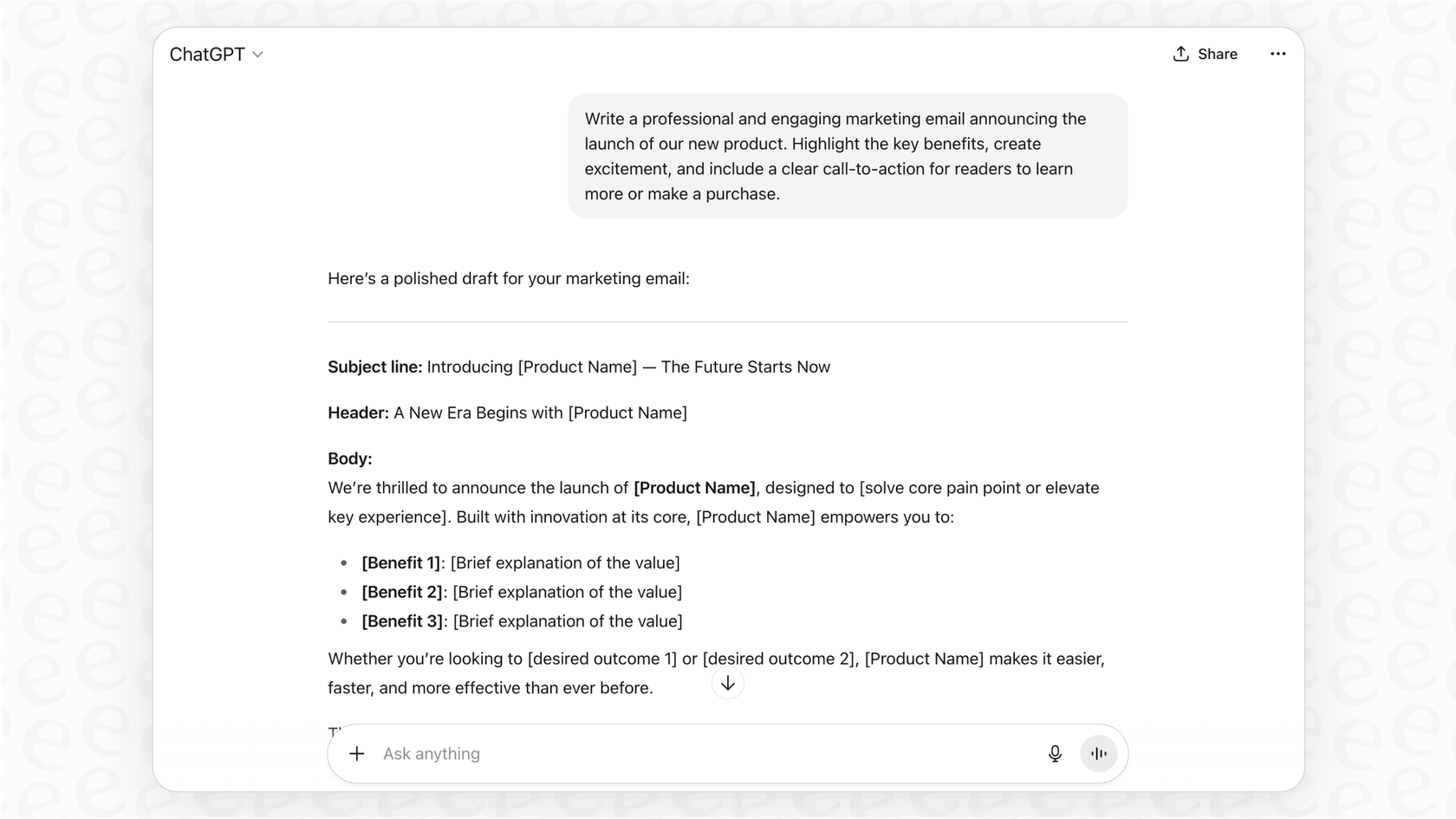
But its biggest strength, being a generalist, is also its weakness for specific jobs. When it comes to something like customer support, it doesn't have the direct integrations or workflow controls of a purpose-built tool like eesel AI. You can't just connect it to your help desk and have it learn from past tickets or take actions on your behalf.
Pros:
- Incredibly versatile for a huge range of tasks.
- Easy-to-use conversational interface.
- A very capable free version is available.
Cons:
- Not built for specific business workflows like customer support.
- Lacks direct integrations with tools like help desks.
- Can sometimes make up facts (or "hallucinate").
Pricing: Free plan available. ChatGPT Plus starts at $20/month.
3. Notion AI
Notion has become the "second brain" for a lot of teams, and its built-in AI features make it even better. Right from your workspace, you can summarize meeting notes, pull out action items, draft documents, and even translate text.
One of its best features is the Q&A function. You can ask questions and get answers pulled directly from all the information stored across your Notion pages. It effectively turns your entire workspace into a smart, searchable knowledge base.
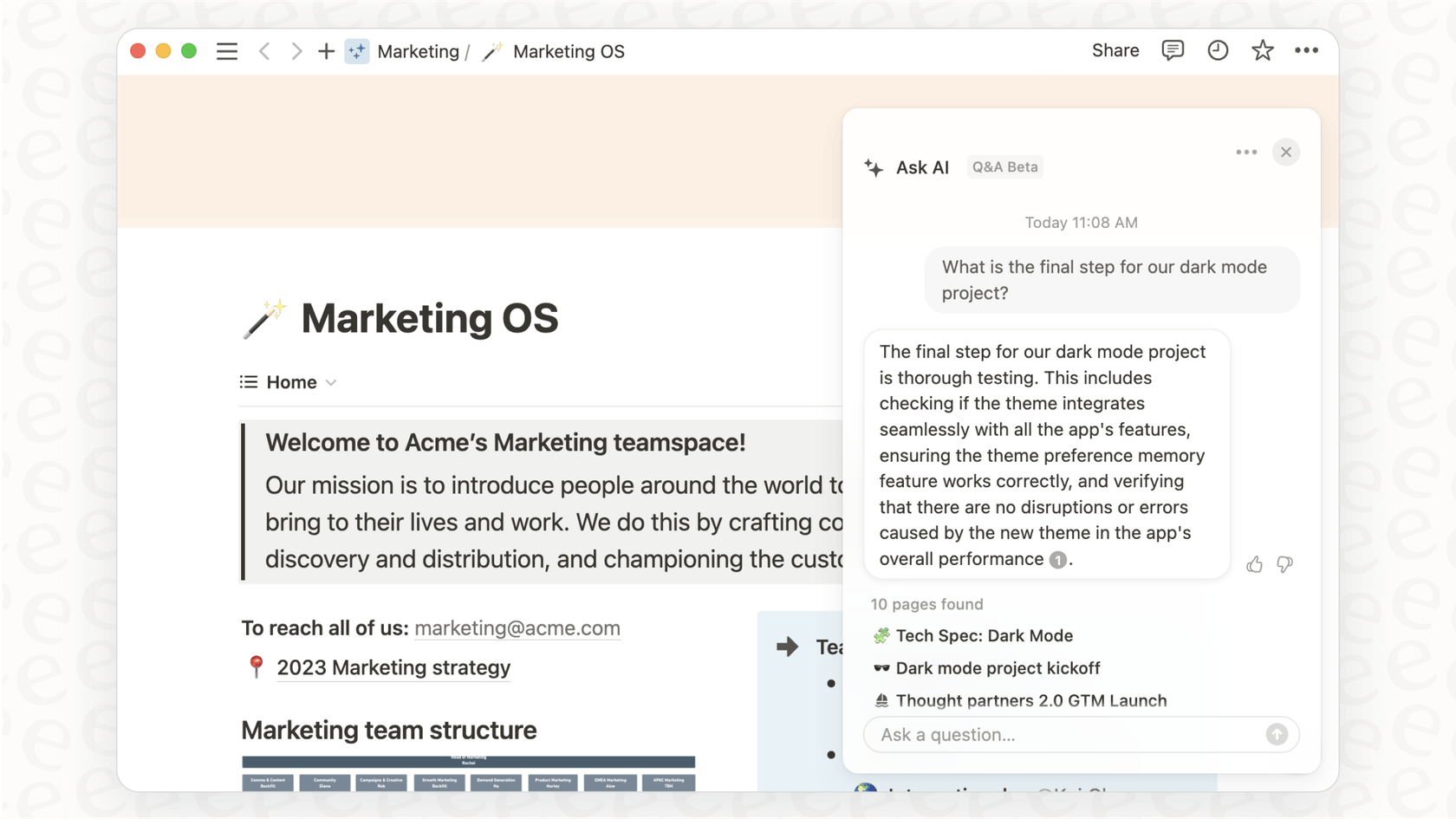
It’s great for managing knowledge that's already written down, but it’s not designed for the real-time, back-and-forth support that happens in Slack or a help desk. For quick employee questions, a tool like eesel AI's Internal Chat is often a better fit, since it lives where the conversations are already happening and can pull answers from sources beyond just Notion.
Pros:
- Fits perfectly into the Notion workspace.
- Great for summarizing and acting on documented knowledge.
- Turns your wiki into a Q&A database you can search.
Cons:
- It can only access information stored inside Notion.
- Not built for real-time, conversational support in chat tools.
Pricing: Available as an add-on for $10/user/month.
4. Zendesk AI
Zendesk AI is a powerful, enterprise-grade suite of features built directly into the industry-leading help desk platform. It helps with things like intelligent triage, which automatically categorizes and routes tickets, AI-powered bots that handle common questions, and tools that suggest replies for human agents.
The main benefit here is the seamless, deep integration. If your team is already using Zendesk, these AI features feel like a natural, high-performance extension of your workflow. The AI can analyze a customer's intent and sentiment with impressive accuracy to help prioritize what to work on next.
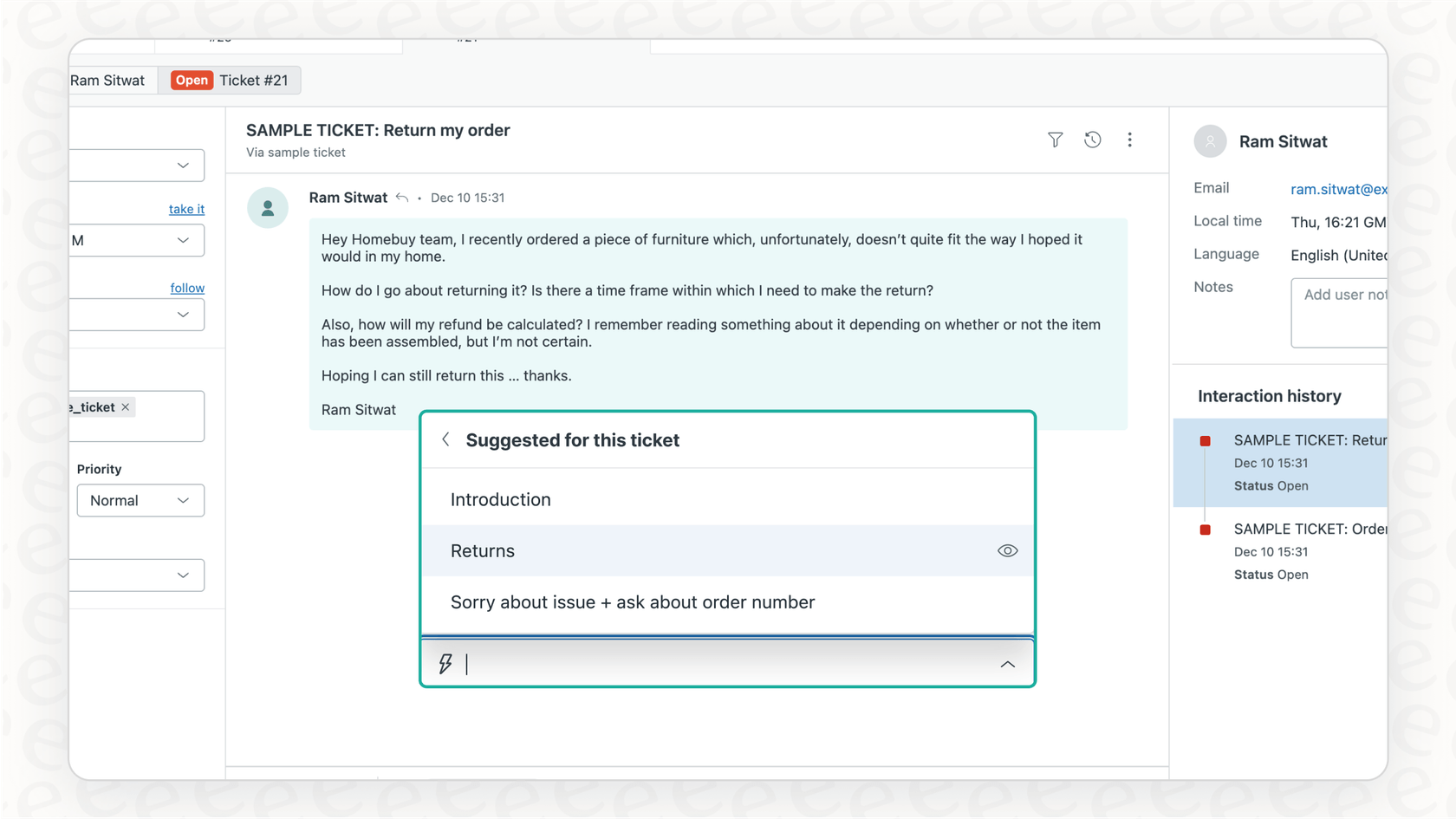
Zendesk AI is a highly mature system optimized specifically for customer service excellence. While it is built to thrive within the Zendesk ecosystem, it also offers a vast marketplace for those who want to add additional layers. For instance, a tool like eesel AI can complement your Zendesk setup by connecting even more external knowledge sources into your existing Zendesk workflow.
Pros:
- Deeply integrated into the industry-leading Zendesk platform.
- Strong, reliable features for sorting and routing tickets automatically.
- Trusted by thousands of companies for its scalability and performance.
Cons:
- Best for teams looking for a mature, all-in-one ecosystem.
- Offers tiered plans to match different team sizes and enterprise needs.
Pricing: Offered as an add-on to Zendesk Suite plans.
5. Synthesia
Synthesia is an AI video platform that lets you create polished videos with AI avatars just from text. It's a pretty cool way to make training materials, product demos, and company announcements without needing cameras, microphones, or actors.

You just type up your script, pick an avatar and a background, and the platform generates a video with a realistic presenter saying your words. It supports over 140 languages, making it a great option for creating content for a global audience without breaking the bank. For L&D and marketing teams, this can be a huge time and money saver.
Pros:
- Slashes the time and cost of making videos.
- Lots of realistic AI avatars and voices to choose from.
- Supports over 140 languages for creating content at scale.
Cons:
- Not the right fit for every type of video (like live-action stories).
- The avatar movements can sometimes look a bit stiff.
Pricing: Starts at $29/month for the Personal plan.
6. Zapier
Zapier is the duct tape of the internet, connecting thousands of different web apps so they can talk to each other. While it's not a generative AI tool itself, it uses AI to help you build automated workflows (called "Zaps") and has AI-powered steps you can add to them. For example, you could set up a Zap that triggers when you get an email, uses OpenAI to summarize it, and then posts that summary in a Slack channel.
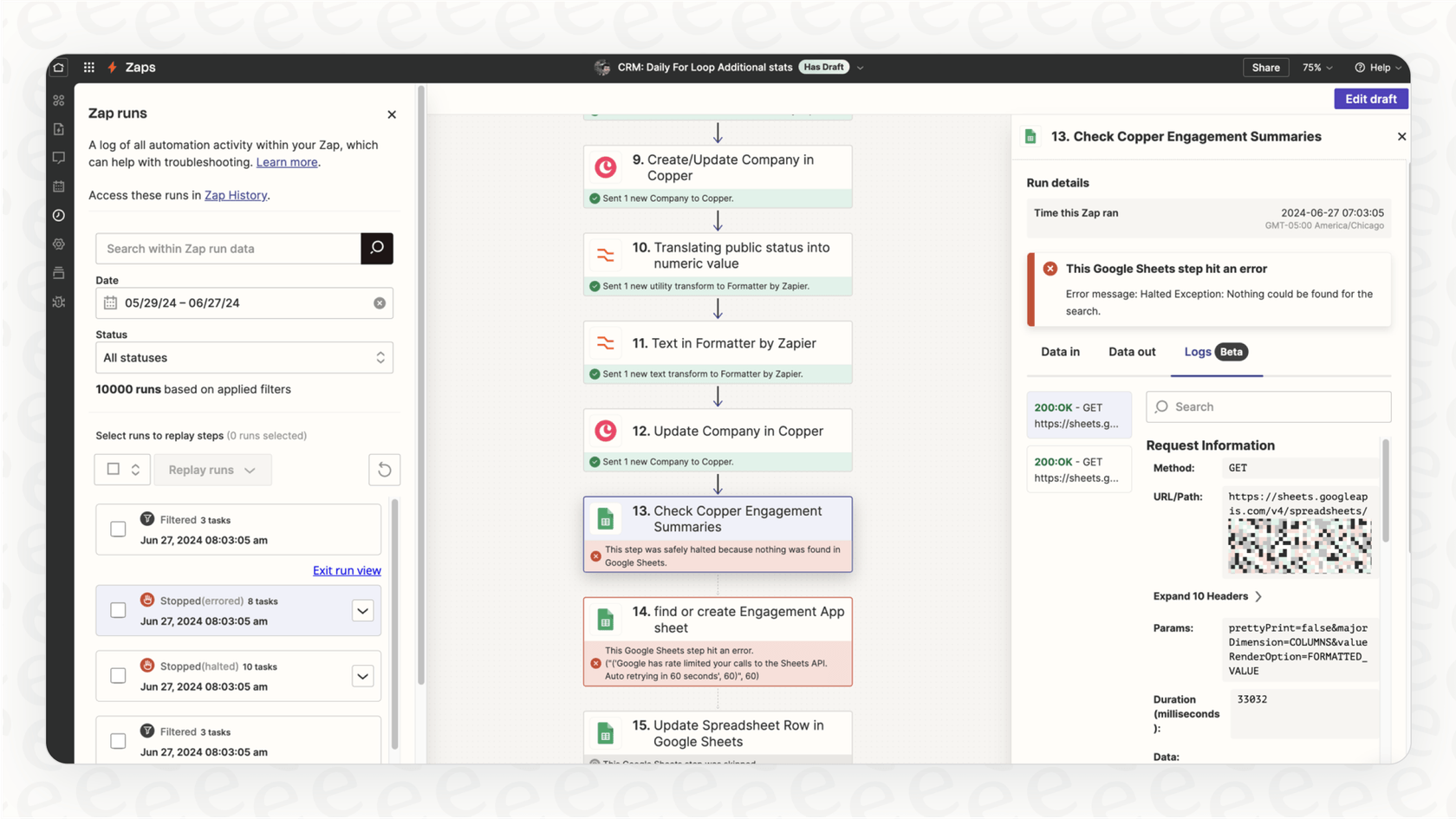
It's the glue that holds a lot of business workflows together, letting you automate boring, repetitive tasks between tools that don't normally work together. It’s perfect for straightforward, trigger-based automation.
Pros:
- Connects more than 7,000 different applications.
- Easy-to-use, visual workflow builder.
- Has AI features to help you build smarter automations.
Cons:
- Can get pricey if you have a lot of tasks running.
- Not built for the more complex logic you'd need for something like support automation.
Pricing: Free plan available. Paid plans start at $19.99/month.
7. Midjourney
Midjourney is an AI image generator known for creating beautiful, artistic images from simple text prompts. It all happens inside Discord, where you type commands to the Midjourney bot to generate your artwork.
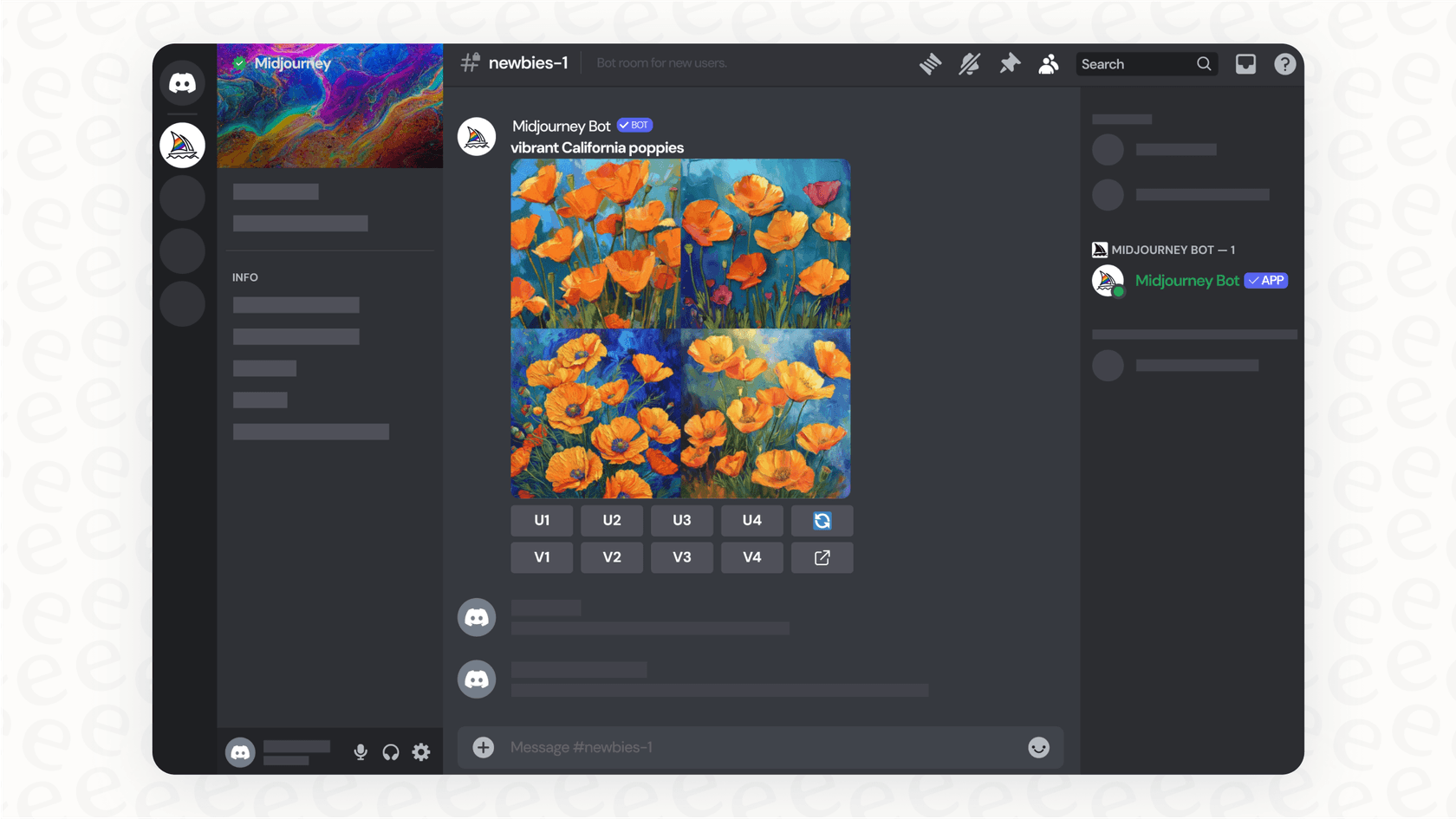
It’s become a favorite for artists, designers, and marketers who need unique visuals for websites, social media, or presentations. It has a distinct, almost painterly style that makes its images stand out from more photorealistic generators. If you want to create art, not just an image, Midjourney is a great choice.
Pros:
- Produces incredibly high-quality and artistic images.
- Has a strong community on Discord for help and inspiration.
- Offers powerful tools for controlling the style of your images.
Cons:
- Using it through Discord can take some getting used to.
- There's no longer a free trial.
Pricing: Starts at $10/month.
This video explores seven of the best free and powerful artificial intelligence products you can try to boost productivity and automate tasks.
How to choose the right artificial intelligence products for your business
Picking the right AI product can feel like a huge task, but it gets a lot easier when you know what problem you’re trying to solve. Here are a few tips to help you decide:
Start with a clear goal. Don't just get AI for the sake of it. Pinpoint a specific headache. Is your support team drowning in tickets? Are employees wasting time trying to find company info? A clear goal helps you filter out the noise. For example, if you want to optimize your team's resolution time, using a reliable platform like Zendesk along with a tool like eesel AI for customer service makes sense.
Go for self-serve and fast setup. Your time is valuable. Look for artificial intelligence products you can try and set up yourself, without sitting through long demos. A tool you can get running in an afternoon is way more valuable than one that takes months to roll out.
Look for simulation or testing features. The biggest worry with AI is not knowing how it’ll behave in the real world. Platforms that let you run simulations, like eesel AI, give you a risk-free way to test the AI on your own data and see the impact. That’s much better than just trusting a vendor's perfect demo.
Make sure it works with your existing tools. Try to avoid solutions that require you to switch platforms. The best AI products act as a smart layer on top of your current help desk, wiki, and chat tools, making them better instead of replacing them.
Go beyond the hype with practical artificial intelligence products
The world of artificial intelligence products is moving fast, but the most successful companies aren't chasing every shiny new thing. They’re picking practical, well-designed tools that solve specific problems and show real results.
Whether you're looking to automate your support desk with a mature platform like Zendesk, make internal knowledge easier to find, or speed up content creation, the trick is to pick a tool that fits into your current workflow. Find something that lets you start small, test confidently, and grow at your own pace.
Ready to see how a purpose-built AI can help your support team? Try eesel AI for free and you can be up and running in minutes.
Frequently asked questions
Not anymore. Many of the best tools, especially those on this list, are designed to be self-serve with no-code setups. You can often connect your existing apps and have them running in minutes without writing a single line of code.
Start with the specific problem you need to solve. If you need a versatile assistant for drafting content and brainstorming, a general tool like ChatGPT is great. If you need to automate a specific business workflow like customer support, a specialized tool like eesel AI will give you better results because it's built for that job. Some vendors offer general-purpose artificial intelligence products that can be tailored for unique needs.
Yes, look for products that offer a free trial or a simulation mode. For example, tools like eesel AI let you test the AI on your past support tickets to see exactly how it would have performed. This gives you a clear, data-backed estimate of your potential savings before you launch.
Security is a valid concern, so always review a vendor's security and privacy policies before signing up. Reputable AI products will have clear documentation on how they handle your data, offer robust security features, and comply with standards like SOC 2 and GDPR.
The biggest mistake is adopting AI without a clear goal. Companies that see the best results start by identifying a specific pain point, like repetitive support tickets or hard-to-find internal documents, and choosing a tool designed to solve that one problem well.
Pricing often reflects the tool's purpose and complexity. General-purpose tools like ChatGPT can offer free plans because they serve a massive audience. Specialized business tools like eesel AI or Zendesk AI offer enterprise-grade value because they solve high-value problems, require complex integrations, and provide dedicated support for business-critical workflows.
Share this post

Article by
Kenneth Pangan
Writer and marketer for over ten years, Kenneth Pangan splits his time between history, politics, and art with plenty of interruptions from his dogs demanding attention.






